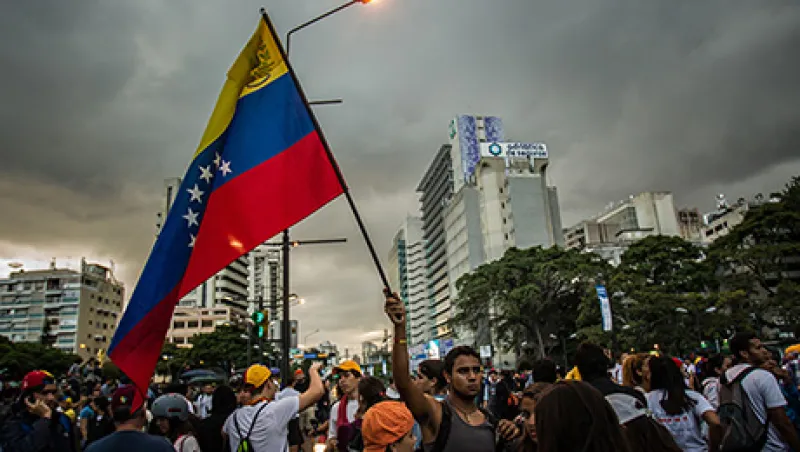It was 8 a.m. on March 11 when I was awoken by a call on my cell phone. “Is that Mr. Mitchell?” a man asked, in Spanish. Yes, I said. In a serious voice, the man told me he was calling on behalf of the local commander of the regional paramilitary force. His boss was afraid that a group of people wanted to harm me. His chief could protect me, the man said, if I handed over 100,000 bolivares ($15,900 at the official exchange rate, $1,540 at the black market rate). To rub in the gravity of the threat, he proceeded to tell me a series of intimate details about me that only a tiny number of people know. Shaken, I put the phone down.
I immediately went to visit a well-connected friend, let’s call him Pedro, who sides with the government politically. Pedro runs a travel agency in the center of Mérida, the beautiful Andean city (metro area population 350,000) where I have lived for the past three and a half years. As soon I started telling him my story, he knew exactly where it was heading. Two years ago he had been the victim of a similar extortion attempt. As we were talking in his office, I received another call from the extortionist, who asked why I had hung up earlier. I said I did not want to speak to him and was going to the police. He asked me which branch. I did not respond and hung up.
Pedro told me to stay calm and took me to visit some of his friends with the National Intelligence Service, called Sebin. In the parking lot of their building, I met two hard-looking men. When I began telling my story, they laughed as soon as I said that the caller claimed he was acting on behalf of the paramilitary commander. Apparently, this line is used a lot in extortion attempts. The agents did not even bother to take down the caller’s number. If he called again, they advised, I should be aggressive and tell him to get lost. Later Pedro told me that those Sebin agents had a reputation of taking half the stolen goods of the people they arrested, and beating up the people “in their care.”
I tried to remain calm throughout the day despite getting another five calls from the extortionist, none of which I answered. That evening I went with friends for dinner in one of Mérida’s best restaurants, La Chistorra. The journey normally takes only 10 minutes from my apartment, but this night it took 45 minutes.
Mérida is at the center of opposition protests against the government of Nicolás Maduro, who took over as president in April 2013 after the death of his predecessor and mentor, Hugo Chávez. The protests are being led by students who have erected barricades that block two of the city’s main thoroughfares, Los Próceres and Las Américas. The resulting traffic jams are terrible.
After dinner, we couldn’t find a taxi. The city’s taxi drivers were on strike, we discovered, because an unknown group had stolen two cabs earlier that day. La Chistorra’s owner gave us a lift home.
As we got out of his SUV a Venezuelan friend, let’s call him Ricardo, took a call on my phone from the extortionist (this time he was calling from a different number). As we entered my apartment, the man started to describe how we were dressed and how we had returned to the apartment. We had been followed. He said that if I did not hand over the money within 48 hours, I would be killed. Ricardo eventually put the phone down after agreeing to talk again in the morning to get the details of how we should hand over the money. Panicked, we phoned family and friends, including Pedro again. In fear for our lives, I telephoned the Foreign Office in London (I am British) and was put through to the Global Response Centre, where a man advised that the official recommendation in extortion cases is to contact the local police.
Ricardo was opposed to this. In Venezuela, he said, life is worth little and the police were likely to do nothing — that is, if they weren’t in cahoots with criminals. I was inclined to agree. Two and half years ago, four friends and I were assaulted and robbed by two armed men in my apartment; the police did nothing to investigate.
For me, the extortion threat was the last straw. I knew Latin America well. I had already spent seven and half years living in Buenos Aires and one year in Santiago. When I first moved to Mérida, I fell in love with the place. It is a university city with 70,000 students, located in a stunning lush green valley. I entered a relationship quickly and made many friends. Most Venezuelan people are extraordinarily warm and charming and exhibit a Caribbean love of life. I thought I would spend many years living there.
I had experienced petty crime in Latin America before, but as I soon discovered, Venezuela is in a whole different league. For a foreigner with some financial means, Mérida and the city of San Cristóbal, in the neighboring state of Táchira, have become virtually uninhabitable over the past few months. Life is becoming increasingly difficult for a large chunk of Venezuela’s middle class, but most of them are trapped without the money to escape.
Escape is what I did. On March 13, two days after the first call and having received a further 15 calls from the extortionist in the meantime, my friend Ricardo and I packed our bags and took a taxi to a farmhouse owned by Ricardo’s family, two hours outside Mérida. The next day we took a flight from the local airport in El Vigia to Caracas, the capital. On Saturday we flew out of the country, with no idea of when — or if — we will return.
During the past few weeks, I had started to seriously question whether I could continue living in Venezuela. On return from a trip to Colombia at the start of February to report a story for Institutional Investor, I found Mérida in a state of upheaval. That week student demonstrations in San Cristóbal to protest police inaction following the rape of a student had triggered much wider protests throughout the country, especially in opposition strongholds such as Mérida, the city of Valencia and parts of Caracas and Maracaibo.
From the balcony of my apartment in the center of Mérida, I witnessed a confrontation between students and the police, with students hurling rocks and the police responding by firing tear gas.
Students had erected barricades made of smoldering tires and tree branches in the city’s middle-class districts, only ten minutes on foot from where I lived. The students said they were protecting the neighborhoods from Tupamaros or colectivos, groups of paramilitary vigilantes on motorbikes whom Chávez had promoted as a vanguard of the so-called Bolivarian revolution.
Just after my return from Colombia, I witnessed the menace of these vigilantes when a group of approximately 100 of them rode past my building wearing balaclavas and waving guns in the air. One of them shot at my balcony as I looked on with friends. Many opposition supporters say the colectivos are employed by the state to terrorize and repress them, like the Basij in Iran.
Two weeks ago, on the back of a motorbike taxi, I visited the barricades on Los Próceres and was shocked by the eerie silence and the sense of desolation and terror. It was no longer clear whether those manning the barricades were students in balaclavas or mercenaries of some kind. We had to pay a small sum to get past one of the barricades, which I understand increases to around 200 bolivares for residents seeking passage in the early hours of the morning.
On March 9 Mérida was in a state of shock after Gisela Rubilar, a 47-year-old Chilean woman studying at the University of Mérida, was shot dead trying to clear a barricade near her home on Las Américas. She was an ardent Chavista who was fed up with the blockade disrupting her life.
I asked a friend, an English professor at the university who lives on Las Américas, whether she preferred the presence of the barricades or not. After a moment’s pause, she said it would be better if they remained. She was concerned that the colectivos could break through and rob the residents, something that had already happened in another part of the city in February. Like many young Venezuelans, however, she just wants “out’ of the country; she is contemplating moving to the Colombian capital of Bogotá, where she has relatives. I feel sorry for her, being cooped up in her apartment in the evenings with fear. Every night there are running battles between colectivos on motorbikes and the people manning the barricades; often both groups are armed.
In the early-morning hours of Saturday, March 9, three days before I received the extortion call, two friends — a British man and a Venezuelan woman — were attacked in the street close to my building by a group of six young thugs. The man was able to fend off three of them, but they got away with the woman’s wallet and smartphone, reducing her to tears. Sadly, this has become an all-too-common occurrence in the city.
For now, I have decided that I can no longer live in Venezuela, one of the world’s most dangerous countries. According to the Venezuelan Violence Observatory, a nongovernmental organization, there were 24,763 murders last year, or 79 for every 100,000 inhabitants. The situation has deteriorated so much that the government stopped publishing official figures a couple of years ago.
The government has run the economy into the ground despite the fact that the nation sits atop the planet’s largest oil reserves. Inflation is running at 56 percent. The government budget deficit is more than 10 percent of gross domestic product.
Shortages of basic products such as toilet paper, infant formula, diapers and hand soap are rife. People use napkins instead of toilet paper, even though that is prohibitively expensive for most Venezuelans. Otherwise, they go without, and shower regularly.
Last week I spent a morning going to seven stores just to find shampoo. People line up for two or three blocks just to obtain the ingredients to make their beloved arepa, a flatbread made of ground maize dough or cooked flour. In Mercals, communal grocery stores subsidized by the government, food prices are extremely cheap but the lines are such that people have to spend a whole morning queuing to get the produce.
Salaries are terrible. The minimum wage is around 3,500 bolivares a month, or $54 at the black market rate. One friend of mine works as a public accountant after studying accountancy for four years at university; he earns 7,500 bolivares a month. It is virtually impossible for people like him to afford flights out of the country.
A sense of lawlessness and anarchy seems to be engulfing the country. The middle classes are deeply frustrated by the government, which is seen as inept and corrupt. However, they are also annoyed with opposition leaders who seem to be jockeying for power in any post-Maduro period. Many of the poor just remain confused by what is happening to their country. Chávez divided Venezuela by forever referring to the middle classes as oligarchs and bourgeoisie. Maduro has upped the ante by referring to sections of the middle class as fascist. The level of social resentment is breathtaking.
It didn’t have to be this way. Venezuela is a country of outstanding natural beauty, tremendous resource wealth and a population of 30 million people, the fifth largest in Latin America. It should be one of the most prosperous countries in the region. Instead, it appears on course to becoming a failed state.






